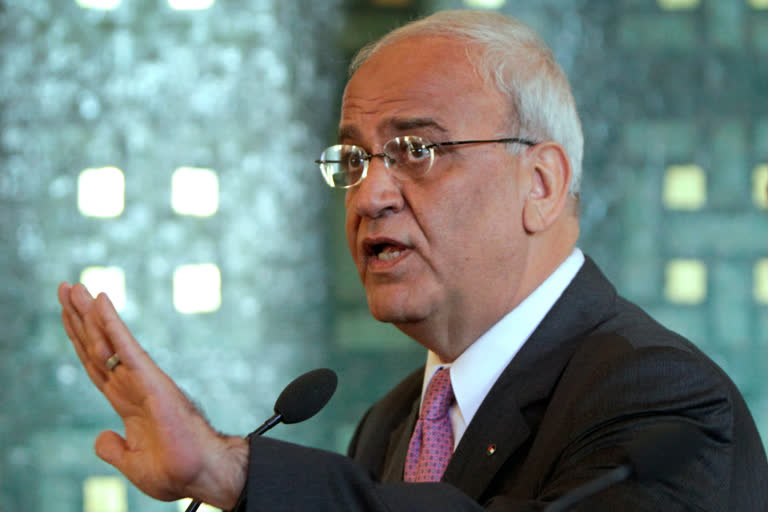Jerusalem: Saeb Erekat, a veteran peace negotiator and prominent international spokesman for the Palestinians for more than three decades died on Tuesday, weeks after being infected by the coronavirus. He was 65.
The American-educated Erekat was involved in nearly every round of peace negotiations between Israel and the Palestinians going back to the landmark Madrid conference in 1991. Over the years, he was a constant media presence. He tirelessly argued for a negotiated two-state solution to the decades-old conflict, defended the Palestinian leadership and blamed Israel — particularly hard-line leader Benjamin Netanyahu — for the failure to reach an agreement.
As a loyal aide to Palestinian leaders — first Yasser Arafat and then Mahmoud Abbas — Erekat clung to this strategy until his death, even as hopes for Palestinian statehood sank to new lows.
Read:|Palestinian official Erekat in critical condition: Israeli hospital
In the weeks leading up to his death in an Israeli hospital, the United Arab Emirates and Bahrain had normalized ties with Israel, breaking with the long-held Arab position that a deal on Palestinian statehood must precede normalization. Abbas and members of his inner circle, including Erekat, found themselves internationally sidelined and deeply unpopular among Palestinians. And decades of unfettered Israeli settlement expansion had made a statehood deal based on the partition of territory increasingly unlikely.
His Fatah party announced his death in a statement. A relative and a Palestinian official confirmed he passed away, speaking on condition of anonymity out of privacy concerns.
Erekat was born on April 28, 1955, in Jerusalem. He spent most of his life in the occupied West Bank town of Jericho, a palm-studded desert oasis about 30 minutes from Jerusalem. As a child in Jericho, he witnessed Palestinians fleeing to nearby Jordan during the 1967 war in which Israel captured the West Bank, East Jerusalem and the Gaza Strip.
In interviews, Erekat often spoke about life and his family in Jericho, as a way of explaining the impact of the Israeli occupation on foreign viewers and to position himself as an ordinary Palestinian. His wit and grasp of colloquial American phrases made him popular with interviewers.
Erekat studied abroad, earning a BA and MA in international relations from San Francisco State University and later completing a PhD at the University of Bradford in the U.K., where he focused on conflict resolution. Erekat also held U.S. citizenship.
When he returned to the West Bank he became a professor at An-Najah University in Nablus and an editor at the Al-Quds newspaper. A self-described pragmatist, he invited Israeli students to visit the university in the late 1980s and condemned violence on all sides.
He was nevertheless convicted of incitement by an Israeli military court in 1987 after troops raided the university and found an English-language newsletter he had authored in which he wrote that “Palestinians must learn how to endure and reject and resist″ all the forms of occupation.
Erekat insisted he was advocating peaceful resistance and not armed struggle, and he was later given an eight-month suspended sentence and fined $6,250. ″If they have reached the point of finding someone like me $6,250 for three words written in English and sent abroad, then the occupation is not working and they are getting nervous,” he later said.
The first intifada, or Palestinian uprising, erupted later that year in the form of mass protests, general strikes and clashes with Israeli troops. That uprising, along with U.S. pressure on Israel, culminated in the Madrid conference, widely seen as the start of the Mideast peace process.
Erekat was a prominent representative of Palestinians living inside the occupied territories at the time but became a close aide to Arafat when the exiled Palestine Liberation Organization returned to the territories following the 1993 Oslo accords. In subsequent years he routinely served as Arafat’s translator and was sometimes accused of editing his remarks to soften the rough edges of the guerrilla leader-turned-aspiring statesman.
Read:|US partnering with Israel in annexation plans: Palestine
